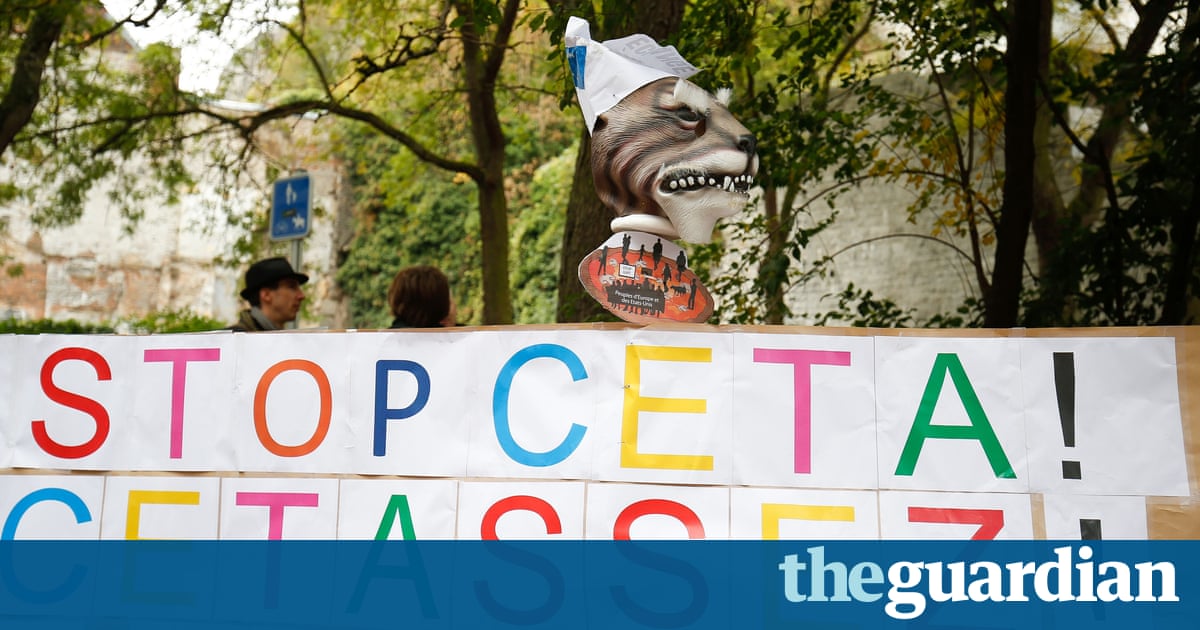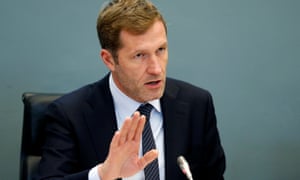‘Ball in Europe’s court’ to rescue Ceta deal, says Canada trade minister

Chrystia Freeland says Canada ready to sign and hopes to return with Justin Trudeau if EU can persuade Wallonia to lift block.

Canada’s trade minister has said it is up to the European Union to rescue a landmark trade deal that is being blocked after the Walloon regional parliament refused to allow Belgium to sign the treaty.
Chrystia Freeland said on Saturday that Canada was ready to sign the pact and that negotiations on its fine points were over. “We have done our job. We have finished negotiating a very good agreement. Now the ball is in Europe’s court,” she said after meeting Martin Schulz, the president of the European parliament, before her flight home.
“I hope that I can return in the next days with my prime minister to sign the treaty as planned.”
The EU’s 28 member states, including Belgium, support the comprehensive economic and trade agreement with Canada, but the region of Wallonia is vetoing the deal.
Schulz, who is not directly involved in the talks but has good working ties with Freeland, held an emergency meeting with the Walloon premier Paul Magnette in a bid to revive the deal.
“The door for every step forward is open but it’s quite clear that the problems on the table are European problems,” Schulz said. “In my eyes, there are no problems that cannot be resolved.”
Freeland quit talks on Friday with chief Canadian and EU trade negotiators and Magnette, declaring reaching a deal with the EU was impossible.
Magnette said on Saturday that his discussions with Canada were concluded and the remaining issues to be worked out were for the EU executive to address. We have still some little difficulties among Europeans, he said, without giving details. We wont hide that so we still have to work and discuss for a certain amount of time.
Freeland made clear that the ball was in the EUs court, saying: We have done our job, it is time for the European Union to finish its [work].
Schulz described Saturdays talks as constructive and perhaps decisive, adding: I remain optimistic. We cannot allow stop at the last kilometre.
But the European parliament president has not played a big role in negotiations so far and it remained unclear what kind of compromise he could broker.
Freeland was on the verge of tears on Friday as she announced the end and the failure of talks with the Walloon government.
Leaving the lysette, the home of the Walloon government in Namur, she said: It seems obvious that the EU is now not capable of having an international agreement, even with a country that shares European values such as Canada, even with a country that is so kind and patient.
Canada is disappointed. I am personally very disappointed. I have worked very, very hard. We have decided to go home. I am truly very, very sad.
The trade agreement, which would eliminate tariffs on most goods between the EU and Canada, has been seven years in the making. But it has stumbled near the finish line as Wallonia, with a population of 3.5 million, blocked Belgiums government from signing the deal. The EU, a single market of 510 million people, requires unanimity on trade deals.

Canadas prime minister, Justin Trudeau, was due to fly to Brussels on 27 October to sign the agreement. And Cecilia Malmstrm, the EU trade commissioner, insisted it was not the end of the road for Ceta. Good progress has been made in most areas of concerns for Wallonia in talks on Ceta. I sincerely believe this is not the end of the process, she wrote on Twitter. The commission had engaged wholeheartedly with Wallonia over the last days and it was truly sad talks have been halted, she added.
Wallonia continues to have concerns about the threat of surging pork and beef imports from Canada and an independent court system to settle disputes between states and foreign investors, which critics say may be used by multinationals to dictate public policy.
Many EU leaders also suspect the local government in Namur of using its devolved powers to play domestic politics.
The collapse of talks will be a heavy blow to EU leaders, who have warned that Europes credibility is on the line. Some also see the disintegrating Ceta deal as a bad omen for the UK, which wants to negotiate a post-Brexit free trade agreement with the EU.
If we cant make it with Canada, I dont think we can make it with the UK, Malmstrm quipped this week.
British officials have played down similarities, arguing that putting up trade barriers will be a very different exercise to taking them down.